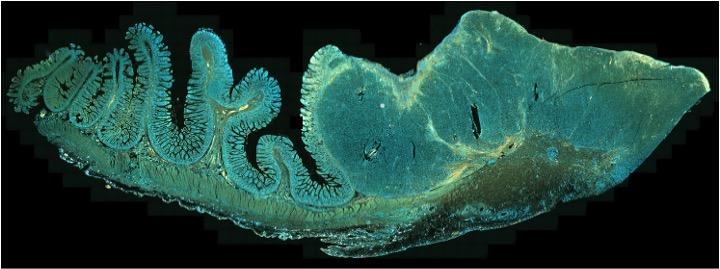Researchers from the UNIGE and the HUG have used information theory for the first time to monitor in vivo the development of resistance mechanisms to a cancer-targeted therapy.

Credit: © R.Merat, Neoplasia 2021; 23 (8): 775-782.
One of the major challenges in modern cancer therapy is the adaptive response of cancer cells to targeted therapies: initially, these therapies are very often effective, then adaptive resistance occurs, allowing the tumor cells to proliferate again. Although this adaptive response is theoretically reversible, such a reversal is hampered by numerous molecular mechanisms that allow the cancer cells to adapt to the treatment. The analysis of these mechanisms is limited by the complexity of cause and effect relationships that are extremely difficult to observe in vivo in tumor samples. In order to overcome this challenge, a team from the University of Geneva (UNIGE) and the University Hospitals of Geneva (HUG), Switzerland, has used information theory for the first time, in order to objectify in vivo the molecular regulations at play in the mechanisms of the adaptive response and their modulation by a therapeutic combination. These results are published in the journal Neoplasia.
Adaptive response limits the efficiency of targeted therapies used to fight the development of tumors: after an effective treatment phase that reduces the tumor size, an adaptation to the used molecule occurs that allows the tumor cells to proliferate again. “We now know that this resistance to treatment has a large reversible component that does not involve mutations, which are an irreversible process”, explains Rastine Merat, a researcher in the Department of Pathology and Immunology at the UNIGE Faculty of Medicine, the head of the Onco-Dermatology Unit at the HUG and the principal investigator of the study.
Research confronted with the complexity of biological regulations
In order to prevent resistance to targeted therapies, scientists need to understand the molecular mechanisms of the adaptive response. “These mechanisms may involve variations in gene expression, for example”, explains Rastine Merat. It is then necessary to modify or prevent these variations by means of a therapeutic combination that blocks the consequences or even prevents them. One challenge remains: the description of these mechanisms and their modulation under the effect of a therapeutic combination is very often carried out on isolated cultured cells and not validated in tumor tissue in the body. “This is essentially due to the difficulty of objectifying these mechanisms, which may occur in a transient manner and only in a minority of cells in tumor tissues, and above all which involve non-linear cause and effect relationships”, explains the Geneva researcher.
Applying information theory to tumors
To counter these difficulties, the UNIGE and HUG team came up with the idea of using information theory, more specifically by quantifying mutual information. This approach has previously been used in biology, mainly to quantify cell signaling and understand genetic regulation networks. “This statistical method makes it possible to link two parameters involved in a mechanism by measuring the reduction in the uncertainty of one of the parameters when the value of the other parameter is known”, simplifies Rastine Merat.
Practically, the scientists proceed step by step: they take biopsies of tumors (in this case melanomas) in a mouse model at different stages of their development during therapy. Using immunohistochemical analyses – i.e. tumor sections – they measure, using an automated approach, the expression of proteins involved in the mechanism at play in the adaptive response. “The proposed mathematical approach is easily applicable to routine techniques such as immunohistochemistry and makes it possible to validate in vivo the relevance of the mechanisms under study, even if they occur in a minority of cells and in a transient manner”, the Geneva researcher explains. Thus, scientists can not only validate in the organism the molecular mechanisms they are studying, but also the impact of innovative therapeutic combinations that result from the understanding of these mechanisms. “Similarly, we could use this approach in therapeutic trials as a predictive marker of response to therapeutic combinations that seek to prevent adaptive resistance”, he continues.
A method suitable for all types of cancer
“This method, developed in a melanoma model, could be applied to other types of cancer for which the same issues of adaptive resistance to targeted therapies occur and for which combination therapy approaches based on an understanding of the mechanisms involved are under development”, concludes Rastine Merat.
###
Media Contact
Rastine Merat
[email protected]
Original Source
https:/
Related Journal Article
http://dx.




